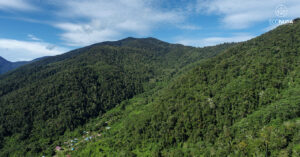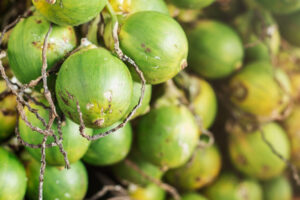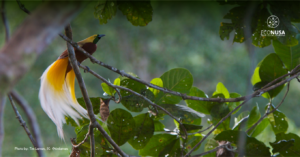
For the people of Papua, noken has a philosophical meaning and its own life symbols. Noken is considered as a symbol of Papuan women, fertility, kinship, economy, good life, peace and identity. As a native Papuan culture, noken has a close relationship with nature. Noken is made from basic ingredients of bark fibers and natural dyes derived from plant roots and forest fruits. Matting made by Papuan mums (mothers of tribes) is generally used as a multipurpose container.
From the superiority and uniqueness of the noken, this unique Papuan knit bag is included in the List of United Nations Educational, Scientific and Cultural Organization (UNESCO) as one of the “Intangible Heritage” and every December 4 is celebrated as “World Noken Day” “.
In the Mari Mari (MaCe) Papuan monthly event held by the Econusa Foundation, this month’s discussion discusses “Noken, Knitting Papuan Community Identity”, by bringing in a number of expert speakers, including noken craftsmen (Mama Papua), Representatives of creative economic business activists, and Program Director of the EcoNusa Foundation
Chairperson of Noken Ania, Merry Dogopia said that noken is a traditional Papuan bag that must be owned by all Papuans. “Noken is the identity of Papua. In that noken we fill all the needs such as crops, property, also as a baby carrier. All of that is in noken, “he explained. Merry also mentioned that he had knit noken since childhood (since childhood).
Papua has approximately 250 tribes, and each tribe is different in knitting noken. “So every tribe is different. There are only women who knit, but there are also men who can knit, “said Merry. The material for making noken comes from bark fibers. But not all bark is utilized, there are special trees taken. The process of noken is also somewhat unique, depending on its size.
Merry explained, if a small sized noken only takes one day, while a medium to large noken can take a week. “Noken which is small in size is usually used for cellphone bags (cellphone), and the process takes 1 to 2 days. While for medium to large noken bags can take up to a week, because we also have to do other activities outside of knitting,” said Merry.
From the creative economy business sector, noken can also be created in many forms besides its function as a bag. Some designers of the country also promote noken to foreign countries in the creation of fashion products.
National Fashion Designer, Yurita Puji revealed that noken in general is knitting which can be applied in many ways like general knitting. He believes that not many lay people know noken deeply, so that is the main reason for Yurita to promote this unique knit of Papua, both inside and outside the country. “For me, promoting it is like giving an identity to the product, that noken belongs to Indonesia,” he said.
Personally, Yurita is interested in bringing products that not many people know, or processing fabric or raw materials that are complicated to be used as a product. Besides Noken Papua, Yurita also promoted NTT, Karawo Gorontalo, Aceh Songket Padang Songket and Lampung Songket, in several performances.
Yurita creates noken into clothing, with a knit-like design line by combining common materials on the market. The point of the combination itself is to make it easier in the manufacturing process, and also reduce production prices to make it more real, so that it can enter the market. “As we know that noken products are rare and the prices are quite high. The unique basic ingredients of noken are an attraction, “said Yurita.
EcoNusa Foundation Program Director, Muhamad Farid, noken made from roots and fibers of various types of trees is one proof of how native Papuans (OAP) are closely related to the services available in the forest. In addition to equipment such as Noken, OAP also utilizes other forest ecosystem services such as medicine and food.
“Therefore we must help the OAP protect the forest. So that the damage caused especially by large-scale industry by doing forest conversion should not be done, because the conversion of the forest is tantamount to disconnecting the lives of people in the Land of Papua, as well as the flora and fauna that make the forest as its home. Forest environmental services are very important for the availability of fresh water, fresh air as the lungs of the world and at the same time absorbing CO2 which is a gas that causes global warming, “said Farid.




